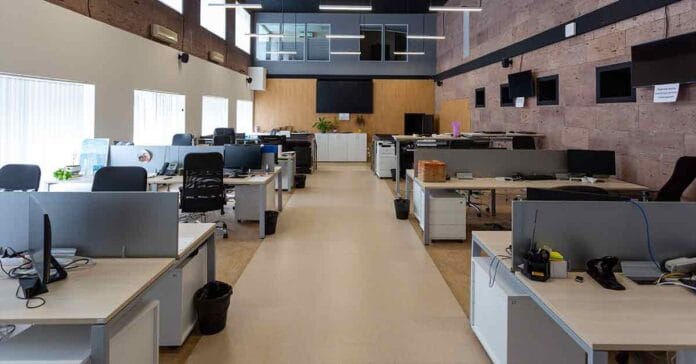It has been long theorised that teams that work in a well-designed office environment are more productive and satisfied. However, as the modern workplace has evolved, what is “perfect” also varies by company. Consider what your company and its employees need to succeed when looking for a new office space with your commercial real estate company.
This could be a traditional office, a remote workspace, or a combination of the two. Location, interior design, and benefits are all crucial factors in the desirability of your company office.
When deciding on the best office space for your company, follow these six steps:
1. Know How Much Space You Need
The first step is to be clear about how much space your physical office needs. Working with too little space promotes inefficiency and congestion while working with too much space leads to waste.
- First, decide how many people you intend to hire. The rule of thumb for buying a commercial office is 1000 square feet per six employees. However, without a doubt, office physical space is a highly subjective concept.
- Next, consider whether you need a dedicated office or a shared workspace. Private offices supply privacy and quiet, while shared workspaces allow co-workers to collaborate.
- Finally, consider your company culture and hence the amenities you would like in your office. If you wish to include a pantry or a recreation room, ensure you account for that additional square footage too.
2. Be Considerate of Your Employees
When moving to a new office, companies should consider their employees’ preferences. Solicit feedback from employees to ensure that your new offices are a good fit. You can be confident that your office has the location and design necessary to keep teams’ productivity and motivation high.
Office relocation also supplies an opportunity for companies to supply new benefits to employees. According to Forbes, 87% of employees want their employer to supply healthier workplace benefits like:
- Wellness areas
- Advantages of Corporate Fitness
- Standing desks
- Lunch options that are nutritious
- Seating that is ergonomic
Evaluate which of these makes sense for your people model based on your company culture.
3. Be Open to Subleasing an Office
When it comes to choosing a new office space, most businesses prioritise price. If you spend too little, you will either end up with an unsatisfactory office or you will be forced to leave after a few months. Spend too much, and you may find yourself unable to pay your rent or forced to move to downsize.
When deciding how much to spend on your next office space, consider the following questions:
- Is it possible for me to pay a three-month rent deposit in this office right now?
- Have I inquired about any added costs? (Maintenance, added parking fees, and so on.)
- Is this office priced competitively with other office spaces in the area?
Question one provides a broad sign of affordability and asking about hidden costs protects you from being hit with unexpected charges. The third question is simply to ensure that you are getting the best possible deal. Make a quick comparison with other office spaces in the area to ensure you are getting excellent value.
If you are just starting to generate revenue but are not profitable, you might not have enough money in the bank to persuade a property owner to rent you commercial space for an extended period. If this is the case for you, real estate agents recommend subletting your first office space. Shorter-term sublease agreements are typically month to month and, in rare cases, week to week. Some can even last an entire year.
4. Prioritise Office Location
When it comes to office space, the most important consideration is location. Having an accessible location is critical for any business because it can make or break the success or failure of any organisation.
Traffic and a lack of parking spaces are major concerns for workers in most developing cities. According to a recent study, nearly one-third of employees arrive late to work at least once a month, with half blaming heavy traffic and gridlock.
Employees do not have to worry about getting to and from work every day because their office is accessible by both public and private transportation. Meanwhile, clients will have no trouble finding your office. Here are two critical questions to ask:
- Can my clients commute to the office without any hassle?
- Can my employees easily get there?
If you find an office that checks both boxes, you are on your way to finding a suitable location. Consider the neighbourhood’s security as well as what is nearby the office. Is there a gym close by? Coffee house? After-work drink? All these things are critical for keeping your clients and employees happy!
5. Evaluate Infrastructure
For some businesses, this is a more important feature than for others. Nowadays, however, few businesses can function effectively without a reliable internet connection. Some offices particularly managed or serviced offices, include internet access as part of their monthly rent. If you are leasing somewhere privately, you will need to account for the cost of connecting a line as well as the monthly access fees.
The service’s quality and dependability are also important considerations. It is pointless to pay for a service that is constantly interrupted or cracks under the strain of a particularly busy day.
Infrastructure does not only refer to the internet. What about postal services or phone lines? With the prevalence of mobile phones these days, the latter may not be as important to you, but postal services are still necessary for signed documents or other physical items.
Here are some questions to ask to ensure that the infrastructure in your new office is adequate:
- Is the cost of any internet access included in the price I will be paying for this space?
- Can I contact any other businesses in the building to learn about their infrastructure experiences?
- Is there a postal address for this office?
- Can I ask the owner for a speed test to ensure that the ISP (Internet Service Provider) is supplying sufficient service?
6. Work with a Trusted Agent/Agency
Hiring a commercial real estate broker, while an added investment, can ease the challenges of office relocation. A commercial real estate firm can help you in quickly find and secure desirable office space. Companies that do not use a broker may find it more difficult to be taken seriously and have their needs met on time. A broker will also ensure that you get a fair deal and that there are no hidden fees or profit centres for the property owner.
To be safe, avoid working with an agent who has never successfully found an office space for someone you know. You would not want to leave something this important to chance, just like when you move somewhere new and look for a new doctor.
Do some added research after you have gathered personal recommendations if you believe it is necessary. Look them up on LinkedIn, if possible, to see what former clients are saying about them.
Finding and selecting an office space that best meets your company’s needs is a challenging task. We hope that the following steps ensure that the office space you eventually want is optimised for increased productivity, improved collaboration, and increased employee engagement.







